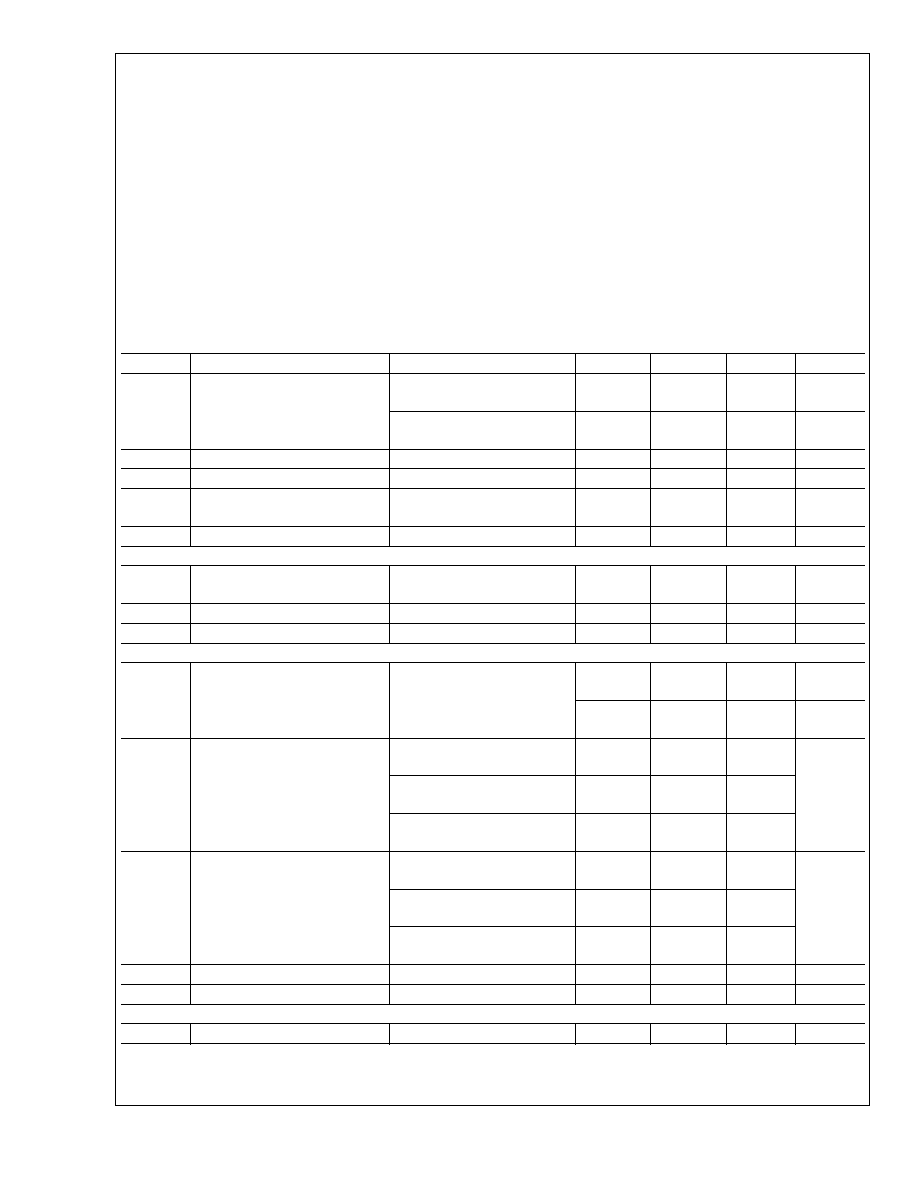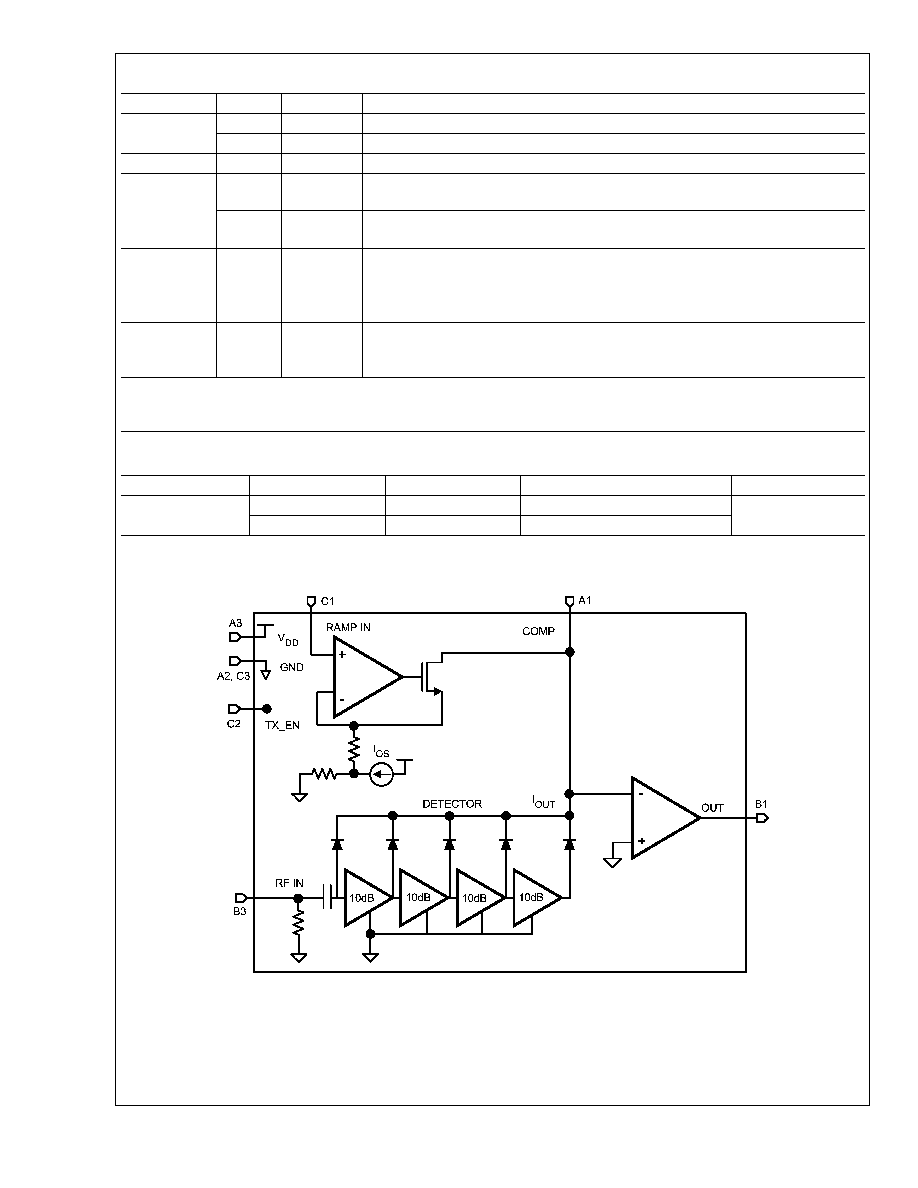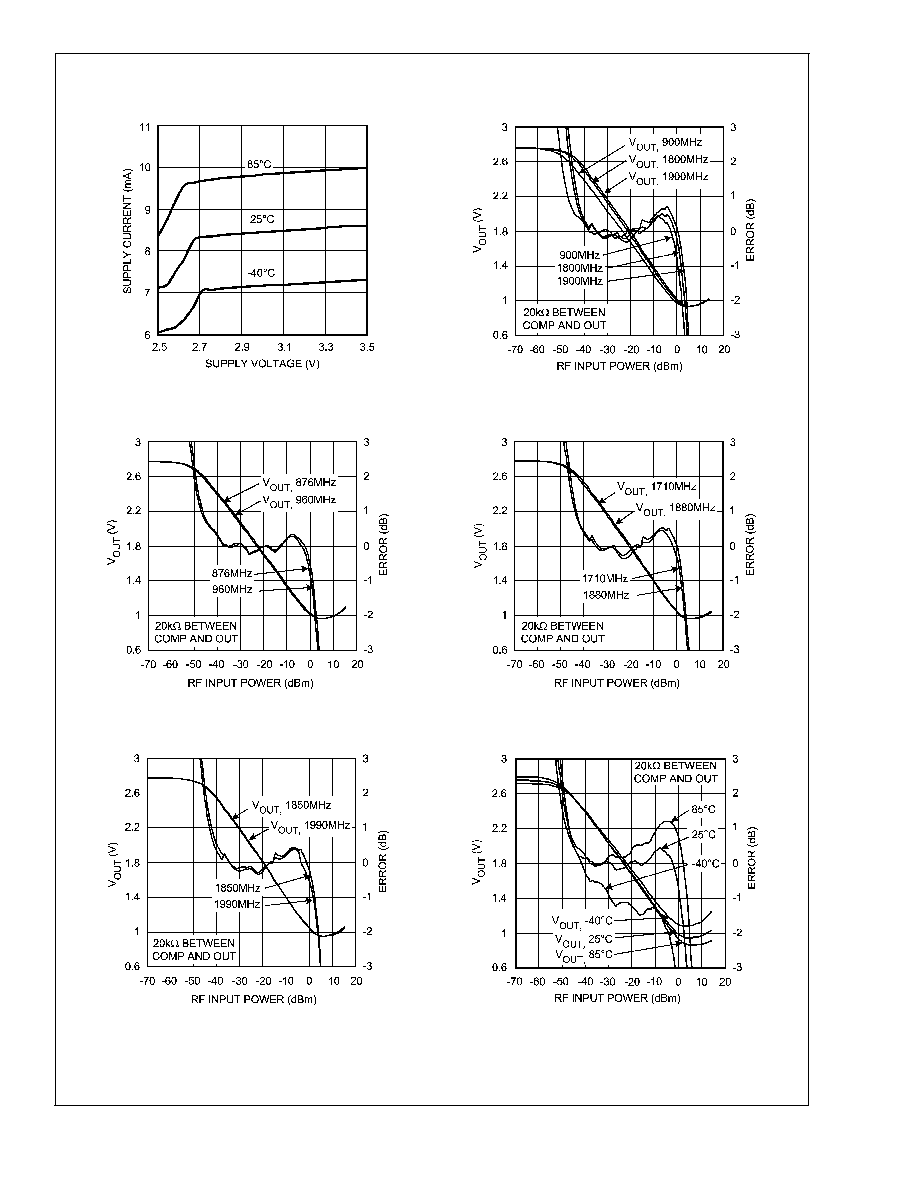 | –≠–ª–µ–∫—Ç—Ä–æ–Ω–Ω—ã–π –∫–æ–º–ø–æ–Ω–µ–Ω—Ç: LMV243 | –°–∫–∞—á–∞—Ç—å:  PDF PDF  ZIP ZIP |

LMV243
Single-Channel, Quad-Band GSM Power Controller in
micro SMD
General Description
The device is intended for use within an RF transmit power
control loop in GSM mobile phones and supports GaAs HBT
and bipolar RF single supply power amplifiers. The circuit
operates with a single supply from 2.7V to 3.3V.
The LMV243 contains an RF detector, error amplifier, ramp
V/I converter and output driver. The LMV243 input interface
consists of the RF input, Ramp voltage, and a digital input to
perform the function 'Shutdown/Transmit Enable'. The de-
vice will be active in the case TX_EN = HI, otherwise, the
device goes into a low power consumption shutdown mode.
During shutdown the output will be in high impedance
(tri-state).
A single external RC combination is used to provide stable
operations that accommodates individual PA characteristics.
The LMV243 is offered in a 8-bump micro SMD 1.5mm x
1.5mm package. This space savings package supports flex-
ible product placement almost anywhere in the circuitboard.
Features
(Typical Unless Otherwise Noted)
n
50dB RF detection range (typical)
n
micro SMD package 1.5mm x 1.5mm x 0.995mm
n
Support of GaAs HBT, bipolar technology
n
Quad-band operation
n
Shutdown mode for Power Save in Rx slot
n
GPRS compliant
n
External loop compensation option
n
Accurate temperature compensation
n
Frequency range is 450MHz to 2GHz
Applications
n
GSM mobile phone
n
AGC for digital audio
n
TDMA RF control
n
Wireless LAN
Typical Application
20029034
May 2002
LMV243
Single-Channel,
Quad-Band
GSM
Power
Controller
in
micro
SMD
© 2002 National Semiconductor Corporation
DS200290
www.national.com

Absolute Maximum Ratings
(Note 1)
If Military/Aerospace specified devices are required,
please contact the National Semiconductor Sales Office/
Distributors for availability and specifications.
Supply Voltage
V
DD
- GND
4V Max
ESD Tolerance (Note 2)
Human Body Model
2000V
Machine Model
200V
Storage Temperature Range
-65∞C to 150∞C
Junction Temperature (Note 6)
150∞C Max
Mounting Temperature
Infrared or convection (20 sec)
235∞C
Operating Ratings
(Note 1)
Nominal Supply Voltage
2.7V to 3.3V
Temperature Range
-40∞C
<
T
J
<
85∞C
V
RAMP
Voltage Range
0V to 2V
V
HOME
Voltage Range
0V to 2V
RF Frequency Range
450MHz to 2GHz
Electrical Characteristics
Unless otherwise specified, all limits are guaranteed to T
J
= 25∞C. V
DD
= 2.8V.
Boldface limits apply at temperature extremes.
Symbol
Parameter
Condition
Min
Typ
Max
Units
I
DD
Supply Current
V
OUT
= (V
DD
- GND)/2
8.7
10.5
12.5
mA
In Shutdown (TX_EN = 0.8V)
V
OUT
= (V
DD
- GND)/2
4.6
30
µA
V
HIGH
Logic Level to Enable Power
(Note 7)
1.8
V
V
LOW
Logic Level to Disable Power
(Note 7)
0.8
V
T
ON
Turn-on- Time from Shutdown
3.7
6.5
7.5
µs
I
EN
Current into TX_EN Pin
0.108
5
µA
RAMP Amplifier
V
RD
V
RAMP
Deadband
170
150
210
250
270
mV
1/R
RAMP
Transconductance
(Note 8)
78
µa/V
I
OUT RAMP
Ramp Amplifier Output Current
V
RAMP
= 2V
100
140
µA
RF Input
P
IN
RF Input Power Range (Note 5)
20k
// 27pF between V
OUT
and V
COMP
-50
+5
dBm
-63
-7
dBV
Logarithmic Slope (Note 9)
@
900MHz, 20k
// 27pF
between V
OUT
and V
COMP
-1.79
µa/dB
@
1800MHz, 20k
// 27pF
between V
OUT
and V
COMP
-1.89
@
1900MHz, 20k
// 27pF
between V
OUT
and V
COMP
-1.89
Logarithmic Intercept (Note 9)
@
900MHz, 20k
// 27pF
between V
OUT
and V
COMP
-50.5
dBm
@
1800MHz, 20k
// 27pF
between V
OUT
and V
COMP
-46.9
@
1900MHz, 20k
// 27pF
between V
OUT
and V
COMP
-45.9
R
IN
DC Resistance
(Note 8)
50
C
IN
Input Capacitance
(Note 8)
0.5
pF
Error Amplifier
GBW
Gain-Bandwidth Product
(Note 8)
7.6
MHz
LMV243
www.national.com
2

Electrical Characteristics
Unless otherwise specified, all limits are guaranteed to T
J
= 25∞C. V
DD
= 2.8V.
Boldface limits apply at temperature extremes. (Continued)
Symbol
Parameter
Condition
Min
Typ
Max
Units
V
O
Output Swing from Rail
Sourcing, I
O
= 5mA
55
85
105
mV
Sinking, I
O
= -5mA
45
75
95
I
O
Output Short Circuit Current
(Note 3)
Sourcing, V
O
= 0V
25
145
mA
Sinking, V
O
= 2.8V
25
180
e
n
Output Referred Noise
RF input = 1800 MHz,
-10dBm, 20k
// 27pF
between V
OUT
and V
COMP
,
V
OUT
=1.4V, set by V
RAMP
,
(Note 8)
700
nV/
SR
Slew Rate
8
5
11
V/µs
Note 1: Absolute Maximum Ratings indicate limits beyond which damage to the device may occur. Operating Ratings indicate conditions for which the device is
intended to be functional, but specific performance is not guaranteed. For guaranteed specifications and the test conditions, see the Electrical Characteristics.
Note 2: Human body model: 1.5k
in series with 100pF. Machine model, 0
in series with 100pF.
Note 3: Shorting circuit output to either V
+
or V
-
will adversely affect reliability.
Note 4: Electrical Table values apply only for factory testing conditions at the temperature indicated. Factory testing conditions result in very limited self-heating of
the device such that T
J
= T
A
. No guarantee of parametric performance is indicated in the electrical tables under conditions of internal self-heating where T
J
>
T
A
.
Note 5: Power in dBV = dBm + 13 when the impedance is 50
.
Note 6: The maximum power dissipation is a function of T
J(MAX)
,
JA
and T
A
. The maximum allowable power dissipation at any ambient temperature is P
D
=
(T
J(MAX)
- T
A
)/
JA
. All numbers apply for packages soldered directly into a PC board
Note 7: All limits are guaranteed by design or statistical analysis
Note 8: Typical values represent the most likely parametric norm.
Note 9: Slope and intercept are calculated from graphs 'V
OUT
vs. RF input Power' where the current is obtained by division of the voltage by 20k
.
Connection Diagram
8-Bump micro SMD
20029035
Top View
LMV243
www.national.com
3

Pin Descriptions
Pin
Name
Description
Power Supply
A3
V
DD
Supply Voltage
A2, C3
GND
Power Ground. Operation requires both pins be grounded.
Digital Inputs
C2
TX_EN
A Logic High to enable device.
Analog Inputs
B3
RF IN
RF Input connected to the Coupler output with optional attenuation to measure the
Power Amplifier (PA) / Antenna RF power levels.
C1
RAMP IN
Sets the RF output power level. The useful input voltage range is from 0.2V to 1.8V,
although voltages from 0V to V
DD
are allowed.
Compensation
A1
Comp
Connects an external RC network between the Comp pin and the Output pin for an
overall loop compensation and to control the closed loop frequency response.
Conventional loop stability techniques can be used in selecting this network, such as
Bode plots. A good starting value for the RC combination will be C = 68pF and R = 0
.
Output
B1
Out
A rail-to-rail output capable of sourcing 25mA and sinking 25mA, with less than 200mV
total voltage drop over the specified temperature. The output is free from glitches when
enabled by TX_EN. When TX_EN is low, the output voltage is near GND.
Note: 1. All inputs and outputs are referenced to GND (pin A2, C3).
2. For the digital inputs, a LOW is
<
0.8V and a HIGH is
>
1.8V.
3. RF power detection is performed internally in the LMV243 and only an RF power coupler with optional extra attenuation has to be used.
Ordering Information
Package
Part Number
Package Marking
Transport Media
NSC Drawing
8-Bump micro SMD
LMV243BL
01
1k Units Tape and Reel
BLA08AAC
LMV243BLX
01
3k Units tape and Reel
Block Diagram
20029036
FIGURE 1.
LMV243
www.national.com
4

Typical Performance Characteristics
Unless otherwise specified, V
DD
= +2.8V, T
J
= 25∞C.
Supply Current vs. Supply Voltage
V
OUT
and Log Conformance vs. RF Input Power
20029024
20029001
V
OUT
and Log Conformance vs. RF Input Power at
Corners of GSM
V
OUT
and Log Conformance vs. RF Input Power at
Corners of DCS
20029002
20029008
V
OUT
and Log Conformance vs. Pin
@
Corners of PCS
V
OUT
and Log Conformance vs. RF Input Power at
900MHz
20029009
20029003
LMV243
www.national.com
5




